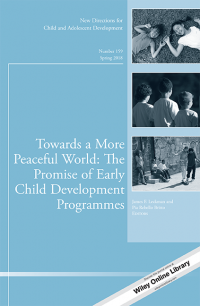2030 Sustainable Development Goals
Introduction
It is time to recognize the importance of early child development. It is also time to celebrate that the 2030 Sustainable Development Goals (SDGs) include, for the first time, an early child development goal. Specifically, the Sustainable Development Goal 4 is to ensure lifelong learning - Early stimulation increases duration of schooling, school performance, and adult income. In addition to this explicit goal, early child development provides a natural link to seven other goals— including poverty reduction, health and nutrition, women and girls’ equality, and ending violence.
- Goal 1: Eradicate poverty – Early childhood development interventions increase adult productivity and income, and reduce inequities.
- Goal 2: End hunger and improve nutrition – Interventions to promote nurturing care help to improve young children’s growth and development.
- Goal 3: Ensure healthy lives – Supporting early childhood development increases quality of home care practices, protects against stress, and reduces risks of chronic disease and improves mental health in adulthood.
- Goal 5: Achieve gender equality – Early childhood development interventions improve motivation and opportunities for learning for girls, so that they can benefit equally from schooling and enter the job market
- Goal 10: Reduce inequality in and among countries – Early childhood stimulation and food supplementation will enable children living in extreme poverty, to attain outcomes closer to more affluent peers.
- Goal 16: Promote peaceful societies – Children who are well nourished and secure have enhanced coping strategies, even in conditions of severe adversity. In the absence of nurturing care there is a high likelihood that an increasing number of children across the globe will be exposed to violence in their homes and communities. The recent Ending Violence in Childhood: Global Report 2017 estimates that in 2015, at least three out of four of the world’s children – 1.7 billion – had experienced inter-personal violence in a previous year. This can have adverse transgenerational consequences leading to a vicious cycle – as parenting begets parenting.
- Goal 17: Strengthen the means of implementation – Early childhood development interventions have the potential to strengthen coordination across sectors to achieve common health, social, and economic goals, and to bring together civil society and governmental partners.
Video (Eng) | Dr. Nicholas Alipui: The UN’s 2030 Agenda for Sustainable Development in Regard to Child Rights (30:30)
Relevant information
This special 2018 issue of New Directions in Child and Adolescent Development features four review articles from authoritative leaders in the field. These articles highlight how far our field has come over the past five decades, as well as how much further effort is needed to refine, adapt, and implement – in a sustainable fashion – responsive parenting and nurturing care programs of proven value across the globe.
JOIN THE CONVERSATION
For breaking news and to stay connected, follow us on social media. Sign up to get our E-News delivered straight to your inbox.



